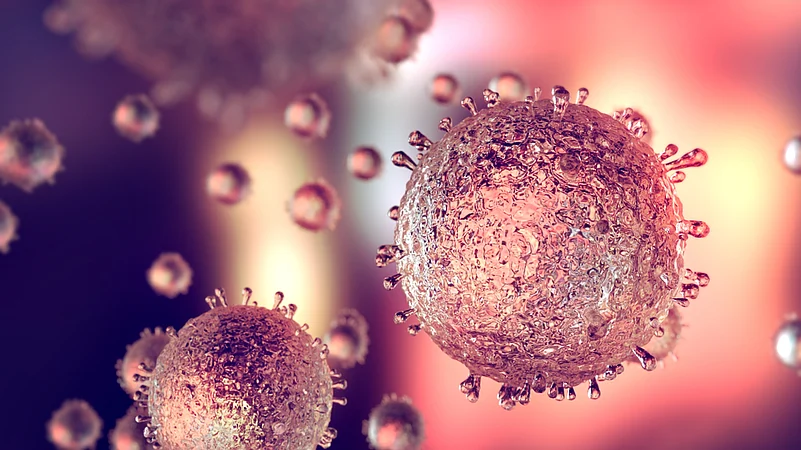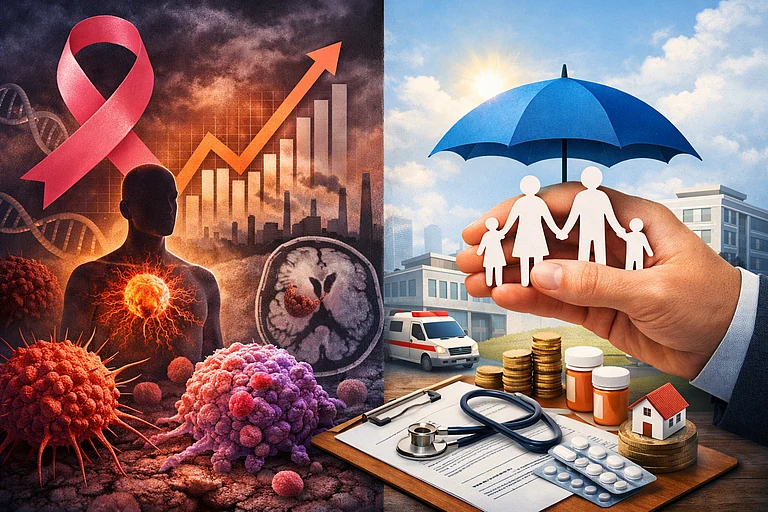By Alok Rungta
Cancer has become an inescapable reality both globally and in India, casting its shadow across families and inflicting both emotional and financial hardship. According to Indian Council of Medical Research (ICMR), the cases in India is projected to rise from 14.6 lakh in 2022 to 15.7 lakh by 2025. The alarming increase threatens not only lives but also the economic stability of countless families. This rising incidence, coupled with limited treatment infrastructure and late diagnosis, creates a perfect storm for families who find themselves unprepared for the financial demands of a cancer diagnosis.
The story of Ashok (Common name used), a resident of Hosapete in Karnataka, reflects the stark realities facing thousands across India. A year ago, Ashok was diagnosed stage-2 oesophageal cancer after visiting Karnataka Cancer Therapy and Research Institute (KCTRI) in Hubballi due to symptoms like swallowing difficulties, chest pain, and weight loss. The estimated treatment cost was around ₹6 lakh, a sum well beyond the reach of Ashok, who, like over 60% of India’s population, lacked any insurance scheme. For Ashok and many like him, the cost of cancer is compounded by the need to travel long distances for specialized treatment, adding logistical and accommodation expenses to an already overwhelming financial burden. India recorded 1.41 million new cancer cases, with breast, cervical, and oral cancers being most common in women, and oral, lung, and stomach cancers predominant in men, according to the GLOBOCAN report.
India’s cancer burden is exacerbated by a healthcare infrastructure that struggles to keep pace with the disease's demands. A recent Parliamentary Standing Committee on Health found that a acbinet-approved scheme from 2013, intended to improve facilities at 39 cancer centers, remains only partially implemented after a decade. This gap in resources means that specialized treatment options are scarce and often located far from patients’ homes, making timely and affordable care inaccessible for many. Late diagnosis remains a formidable obstacle, with approximately 80% of cancer cases in India detected at advanced stages significantly reducing survival rates and high treatment costs due to the complexity of advanced-stage therapies.
Financially, cancer is one of the costliest ailments, driven not only by the high price of therapies but also by the indirect costs of prolonged illness. The National Centre for Disease Informatics and Research projects an 11.6% rise in premature mortality and years of life lost due to cancer between 2021 and 2025. Seven cancers—lung, breast, oesophagus, mouth, stomach, liver, and cervical—comprise over 40% of India’s cancer burden, each with its own costly and complex treatment protocols.
In a country where many individuals remain uninsured or underinsured, the financial impact of cancer can be catastrophic. With treatment costs ranging from ₹7,000 to ₹13,000 per session, depending on the complexity, and cumulative expenses often crossing Rs. 3 to 15 Lakhs (approx.), families are forced to exhaust their life savings, sell assets, or take on debt. For those who do have insurance, the coverage is often insufficient to meet the actual costs of comprehensive cancer treatment, which may include surgeries, chemotherapy, radiation, and supportive care.
National Cancer Awareness Day serves as a potent reminder of the dual challenge that cancer presents in India: the urgent need for awareness and early detection, and the equally pressing need for financial preparedness. While health insurance alone cannot eliminate the emotional toll of a cancer diagnosis, it can alleviate the severe financial distress that often accompanies it. Comprehensive policies that cover critical illnesses and include cancer-specific benefits are essential tools in empowering families to face the uncertainties of this disease with greater resilience.
Addressing this growing burden will require a collaborative effort to improve access to affordable treatment, invest in early detection programs, and promote financial planning that includes health and life insurance. Without these measures, cancer will continue to exact a toll on both lives and livelihoods in India. On this National Cancer Awareness Day, the message is clear: understanding cancer’s impact extends beyond health. Financial resilience and awareness are essential in ensuring that fewer families bear the weight of this disease alone.
(The author is MD and CEO at Future Generali India Life Insurance. Views expressed are personal and do not reflect the official position or policy of Outlook Media Group and/or its employees. The article is for information purpose only; please consult your financial planner/s before investing.)
















